Writing progress notes after long therapy sessions is one of the biggest challenges for mental health professionals. Whether you’re creating SOAP notes, DAP notes, or full treatment plans, the documentation burden can drain your mental space and cut into time with clients.
That’s why many clinicians now rely on the best AI DAP note generator tools. These platforms turn session recordings, bullet points, or dictated notes into structured clinical notes, helping you save time, protect sensitive patient health information with HIPAA compliance, and keep your patient care records accurate and insurance-ready.
In this guide, we’ll compare the top 8 AI DAP note generators in 2026 so you can choose the one that fits your workflow.
What Are DAP Notes?
DAP notes are one of the most widely used note formats in therapy documentation. They help mental health professionals organize their clinical notes into a clear, structured outline that balances efficiency with clinical depth.
A DAP note has three sections:
- Data (D): The factual part of the note. This is where you capture session notes such as what the client said, clinical observations, and important details like changes in mood, sleep, or family history.
Example: “Client reported ongoing anxiety, used OTC sleep aids occasionally, and experienced three panic attacks this week.” - Assessment (A): Your professional interpretation of the patient interactions. This includes clinical feedback, analysis of client progress, and how symptoms align with potential diagnoses.
Example: “Symptoms consistent with generalized anxiety disorder; improved coping skills noted since last visit.” - Plan (P): The roadmap for future care. Here, you note treatment plans, therapeutic interventions, referrals, or next steps for group practices or in-person sessions.
Example: “Introduce CBT relaxation techniques, recommend journaling, and schedule follow-up in two weeks.”
Because they capture both facts and clinical reasoning, structured DAP notes are considered valuable tools in clinical documentation, protecting patient privacy, ensuring insurance billing compliance, and supporting patient care.
What Is a DAP Note Generator? (Types & How They Work)
A DAP note generator is an AI therapy notes generator that helps therapists turn shorthand notes, audio recordings, or session recordings into structured progress notes.
Instead of typing from scratch, you provide input and the AI produces AI-generated notes in the preferred format (DAP, SOAP, or others).
Types of DAP Note Generators
- Recording-based generators
- You record therapy sessions or patient visits, and the AI transcribes and structures the content into structured SOAP notes or DAP notes.
- Best for therapists comfortable recording sessions (with client consent) and wanting hands-free documentation. - Dictation-based generators
- You dictate notes directly after in-person or telehealth sessions. The AI turns spoken summaries into compliant SOAP notes or clinical documentation.
- Ideal for clinicians who prefer voice-to-text workflows and want to reduce typing. - Text or bullet-point generators
- You enter bullet points, client summaries, or shorthand notes, and the AI expands them into professional, insurance-friendly progress notes.
- Great for privacy-conscious clinicians or those who dislike recording sessions. - Hybrid generators
- These tools accept all three inputs, recording sessions, dictation, or typed summaries, giving flexibility depending on the session type.
- Useful for therapists in group practices where providers may have different workflows.
Across all types, leading tools emphasize full HIPAA compliance, protect sensitive patient health information, and allow template customization for different note types.
The goal always remains the same in every case: save time, reduce the documentation process, and ensure clinical documentation is consistent and audit-ready.
Why Therapists Are Turning to AI for DAP Notes
Therapists have always shouldered a heavy load of clinical documentation.
After every therapy session, there are DAP notes, SOAP notes, or treatment plans to complete, work that can stretch late into the night and eat into much-needed downtime. While accurate records are vital for patient care, insurance billing, and protecting patient privacy, the process itself often leads to fatigue and burnout.
AI tools are changing that reality.
Instead of typing out progress notes word by word, clinicians can now rely on AI-generated notes that transform session recordings, bullet points, or dictated notes into structured clinical notes that are secure, compliant, and easy to review.
Here’s what makes AI DAP note generators such a valuable tool in 2026:
- Less admin, more care - With note drafts created in minutes, therapists can spend more time with clients and less time stuck in the note-taking process.
- Consistency and compliance - Notes are formatted into structured DAP notes or compliant SOAP notes, meeting both clinical and Accountability Act standards while protecting sensitive patient health information.
- Adaptable inputs - Whether you prefer to dictate notes directly, use shorthand notes from in-person sessions, or rely on session recordings, modern tools adjust to your preferred format.
- Support for teams - For group practices, AI ensures consistent formatting, making it easier to track client progress across providers.
- Reduced mental load - Offloading repetitive writing helps clinicians preserve their mental space, cut down documentation time, and focus on their therapeutic expertise.
For many mental health professionals, switching to an AI progress note generator isn’t just about efficiency. It’s about creating a sustainable way to keep up with therapy documentation while still prioritizing quality patient care.
Top 8 AI DAP Note Generators in 2026
Now that we’ve looked at why therapists are adopting AI for documentation, let’s dive into the tools themselves.
Each of these platforms is designed to reduce the note-taking process, protect sensitive patient health information, and help therapists produce structured progress notes that are ready for audits, supervision, or insurance billing.
We’ll review 8 of the top options for 2026, covering their unique strengths, limitations, and which type of practice they’re best suited for.
1. Supanote
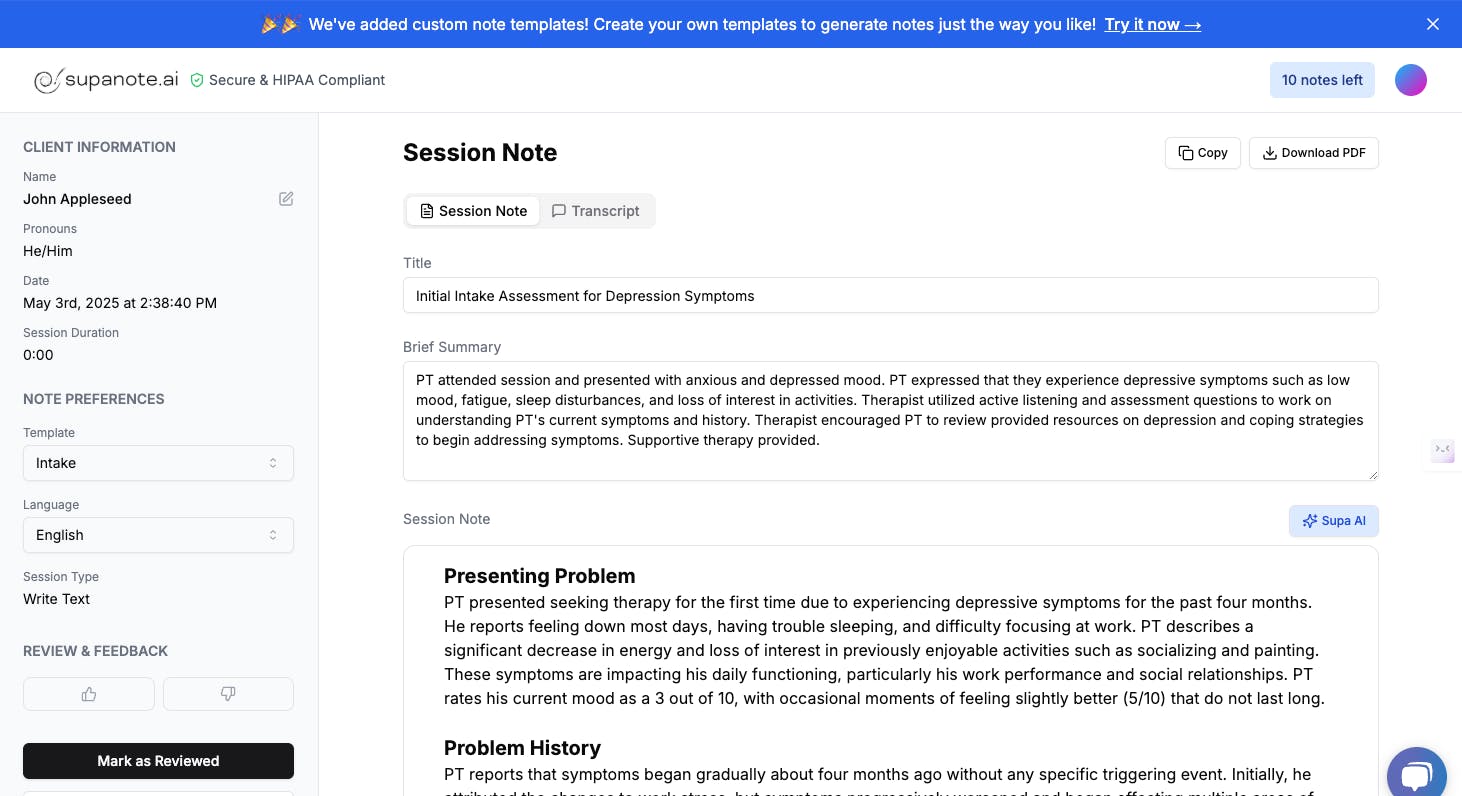
Supanote is built specifically for mental health professionals and supports multiple note templates including SOAP, DAP, BIRP, EMDR, and group therapy notes. Its standout feature, Super Fill, lets you push AI-generated notes directly into your EHR without copy-paste, cutting documentation time in half.
Clinicians can work from session recordings, dictated notes, or bullet points, making it adaptable to different workflows. For group practices, it also offers template customization, ensuring every therapist’s documentation remains consistent yet personal. The platform is fully HIPAA compliant, comes with a BAA, and safeguards sensitive patient health information.
Pros:
- Built for therapy, not generalized medical dictation.
- Supports multiple formats including DAP notes, SOAP notes, EMDR, and treatment plans.
- Personalization options – remembers writing style, terminology, and therapeutic approach
- Super Fill integration reduces errors and saves time.
- Affordable entry plan and flexible pricing tiers.
- Fully HIPAA-compliant with BAA included.
- Human support team available for quick, reliable help
Cons:
- Lower-tier plans limit the number of AI-generated notes.
- Focused on mental health only, not designed for multi-specialty clinics.
Pricing: Starting at $19.99/month for 40 notes, $39.99/month for 100 notes, and $69.99/month for unlimited notes (annual billing).
Best For: Solo therapists or group practices needing therapy-specific, audit-ready notes with strong EHR integration.

2. Upheal
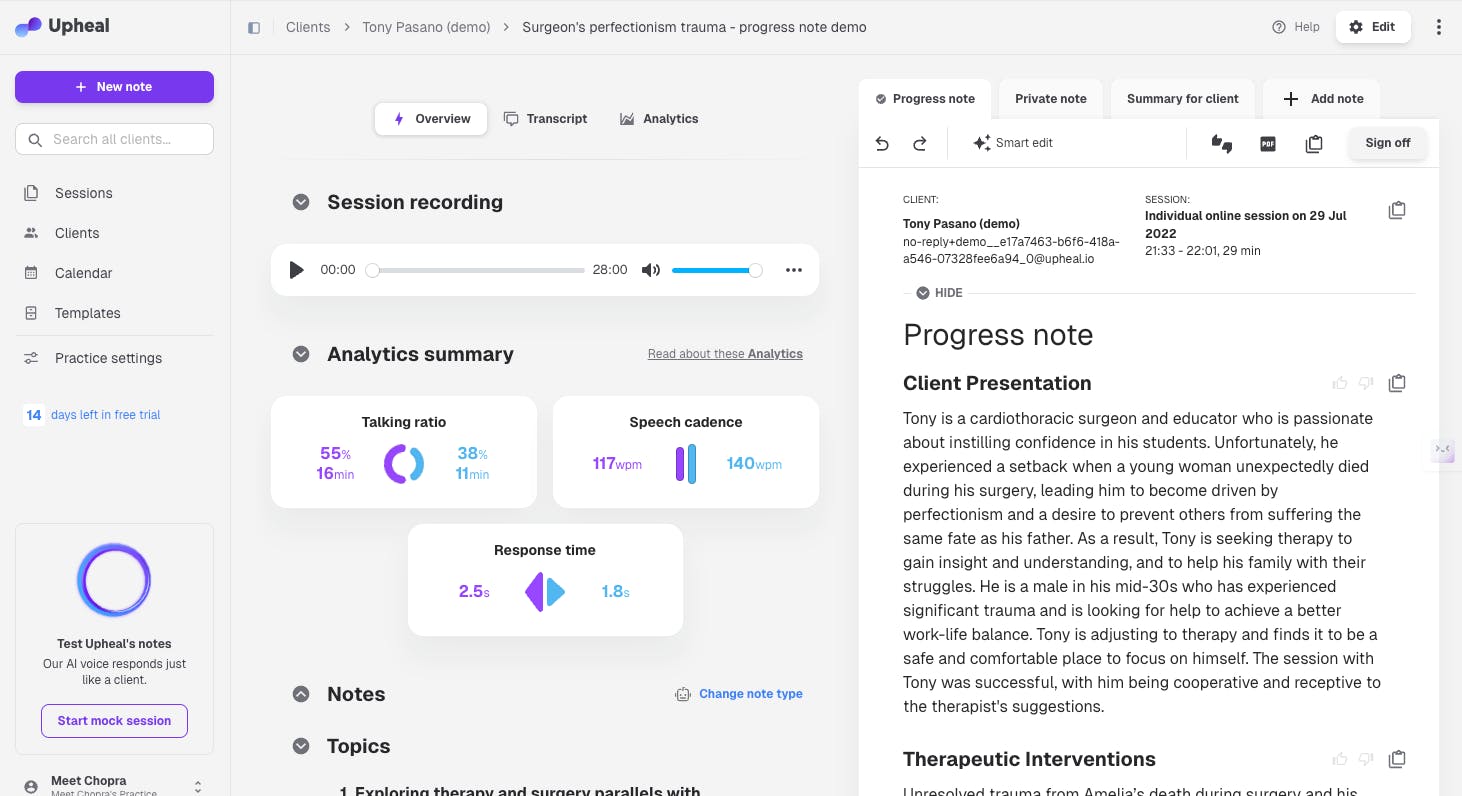
Upheal combines AI progress note generation with advanced analytics for therapy sessions.
It automatically produces DAP notes and SOAP notes from session recordings, while also tracking metrics like talk ratios, emotional tone, and client progress trends. For therapists who want both documentation and insights, it’s more than just a note generator.
Pros:
- Provides structured DAP notes and compliant SOAP notes alongside detailed analytics.
- Free unlimited note generation on the entry tier.
- HIPAA-compliant platform that safeguards sensitive patient health information.
- Tracks session notes, talk balance, and client summaries for better supervision.
Cons:
- Requires recording sessions to unlock full analytics, which may not fit all practices.
- Advanced features may feel excessive for therapists who only want faster note writing.
Pricing: Free plan available; Starter from £19/month, Premium from £59/month.
Best For: Therapists and group practices who want AI-generated documentation plus session analytics to guide treatment plans and measure client progress.
3. Mentalyc
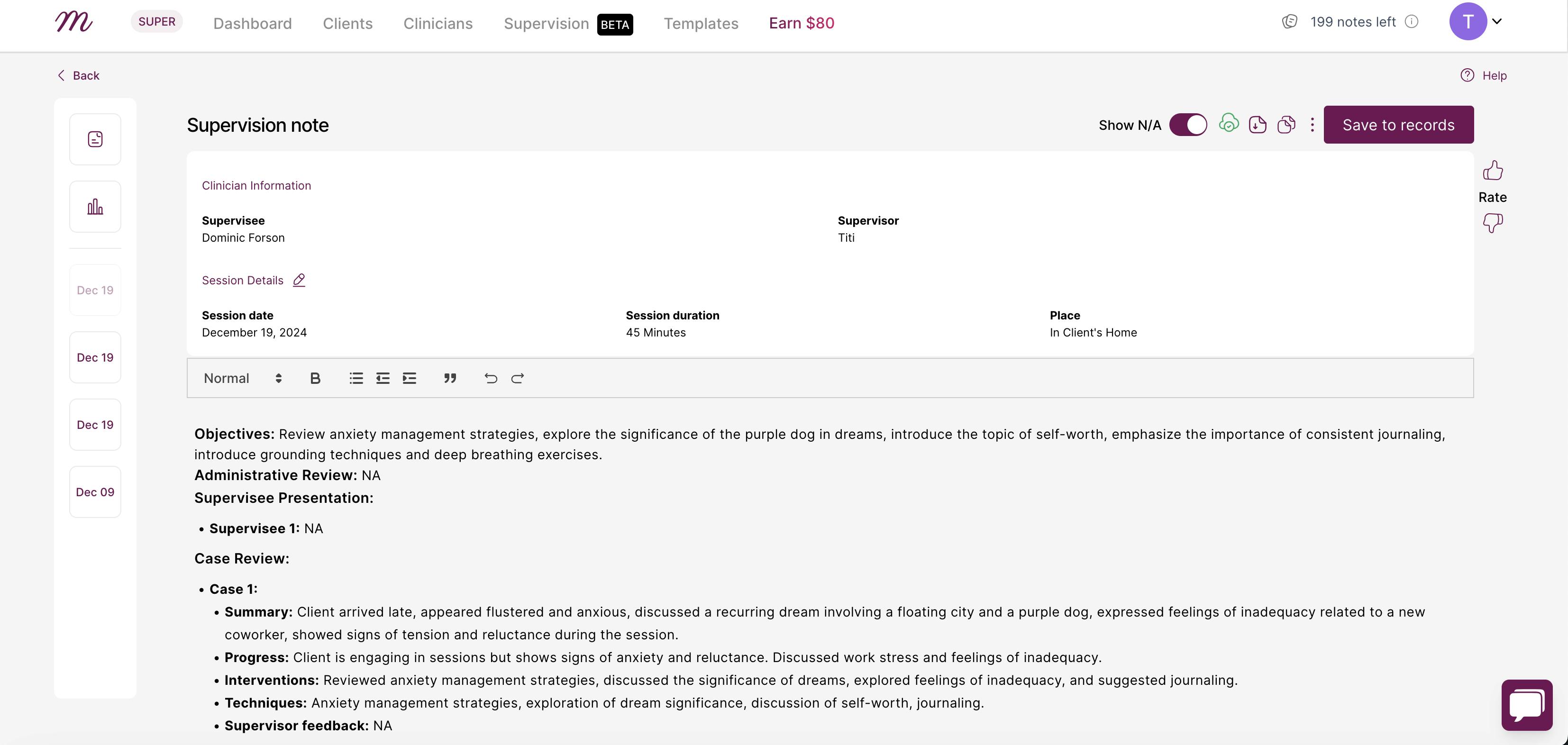
Mentalyc is an AI therapy notes generator designed exclusively for mental health professionals. It supports multiple formats like DAP notes, SOAP notes, BIRP notes, EMDR notes, and even full treatment plans, making it versatile for different therapy modalities.
Pros:
- Wide range of note types beyond just DAP and SOAP.
- Supports treatment plans and progress tracking in addition to session notes.
- HIPAA-compliant with full patient privacy safeguards.
- User-friendly for both solo therapists and larger practices.
Cons:
- Premium tiers can be expensive for smaller caseloads.
- Some users report needing to edit AI drafts to refine clinical language.
Pricing: Mini $14.99/month (40 notes), Basic $29.99/month (100 notes), Pro $59.99/month (160 notes), Super $99.99/month (330 notes) - billed annually
Best For: Therapists seeking a therapy-specific tool with strong support for multiple note templates and built-in progress tracking.
4. AutoNotes
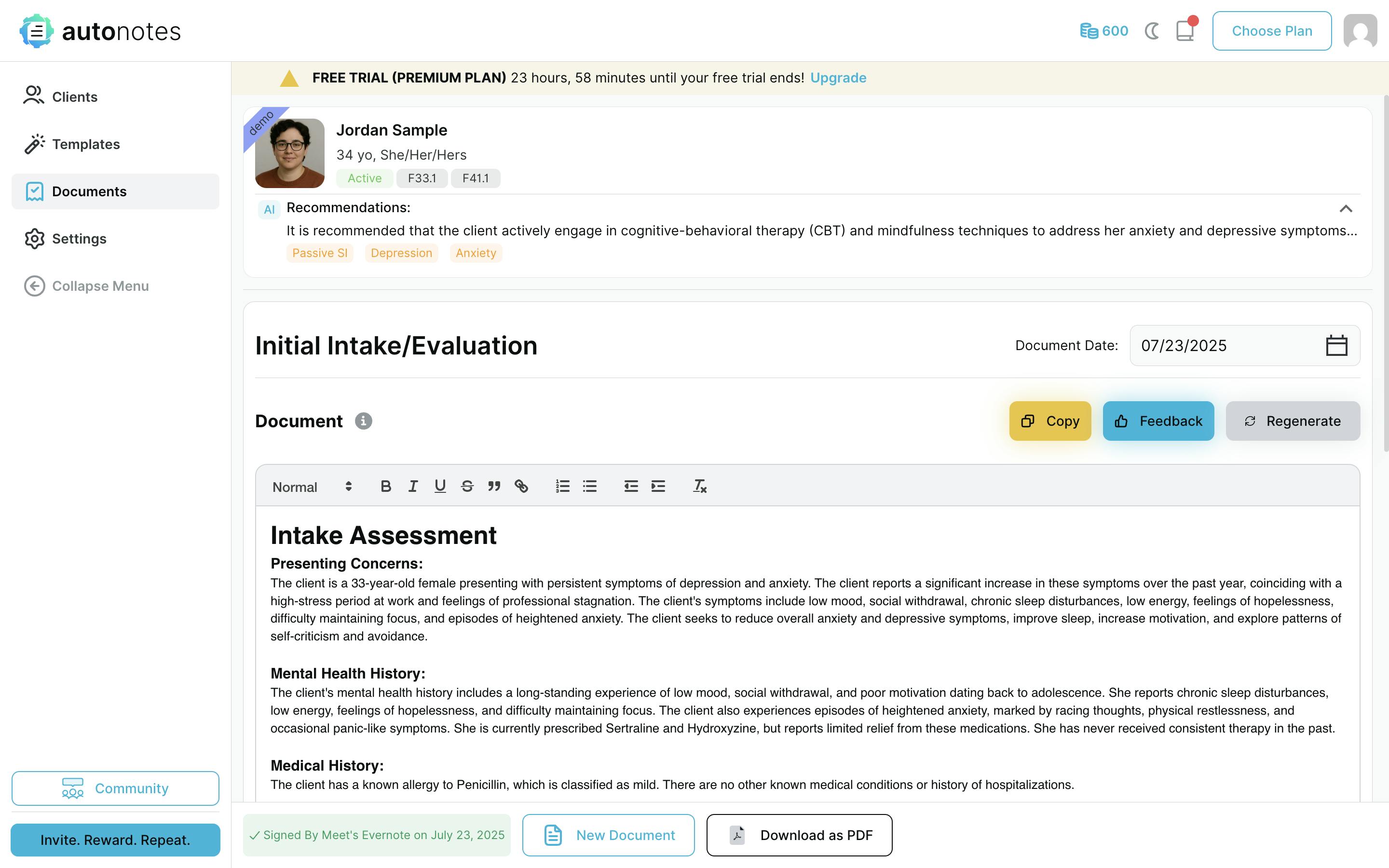
AutoNotes is a versatile AI progress note generator used across different fields, from mental health to physical therapists and even massage therapists. It creates structured DAP notes, SOAP notes, and BIRP notes from session recordings, dictated notes, or typed bullet points, giving clinicians flexibility in how they document.
The tool learns from your writing style over time, producing more accurate AI-generated notes the longer you use it.
Pros:
- Accepts multiple input methods: recording sessions, dictation, or text.
- Supports a range of note types including DAP, SOAP, and BIRP.
- HIPAA-compliant, ensuring sensitive patient health information stays secure.
- Adaptive AI improves accuracy with repeated use.
Cons:
- Less focused on therapy-specific formats compared to tools like Supanote or Mentalyc.
- Higher starting price than some lighter, therapy-only platforms.
Pricing: Essential at $250/year, Premium at $499/year, Ultimate at $999/year (billed annually), with custom pricing for Group Practice plans and a free trial available.
Best For: Multi-disciplinary practices needing one AI note generator that works for different healthcare professionals and specialties.
5. Freed AI
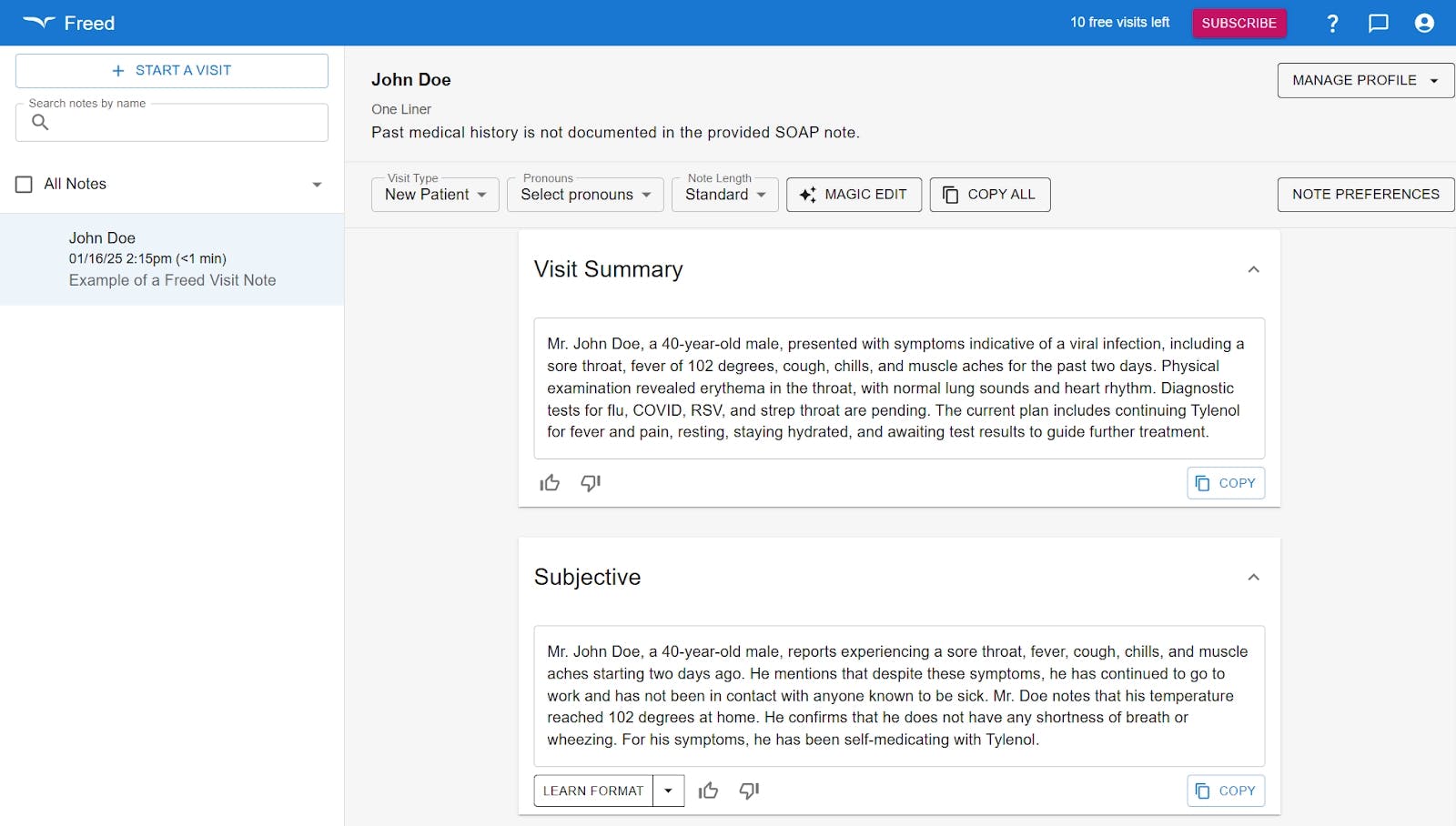
Freed.AI works like a virtual scribe for therapists. By recording therapy sessions, it automatically transcribes and organizes the content into structured SOAP notes or DAP notes. Its biggest appeal is the unlimited notes plan, which makes it a cost-effective option for clinicians with heavy caseloads.
Because it relies on session recordings, Freed offers a mostly hands-free workflow: review the draft, make minor edits, and save. The platform is fully HIPAA compliant and ensures sensitive patient health information is protected, making it reliable for both solo providers and group practices.
Pros:
- Flat monthly fee for unlimited AI-generated notes.
- Automates transcription and structuring, reducing documentation time.
- Hands-free note generation from recording sessions.
- HIPAA-compliant, safeguarding patient privacy.
Cons:
- Requires recording every session, which may not work for all therapists or clients.
- Lacks per-note or light-use pricing for smaller caseloads.
Pricing: Starts at $90/month for solo clinicians, $84/month per clinician for 2–9 users (billed annually), with custom pricing for 10+ users
Best For: Therapists with high caseloads who want predictable pricing and fully automated notes from session recordings.
6. Twofold Health
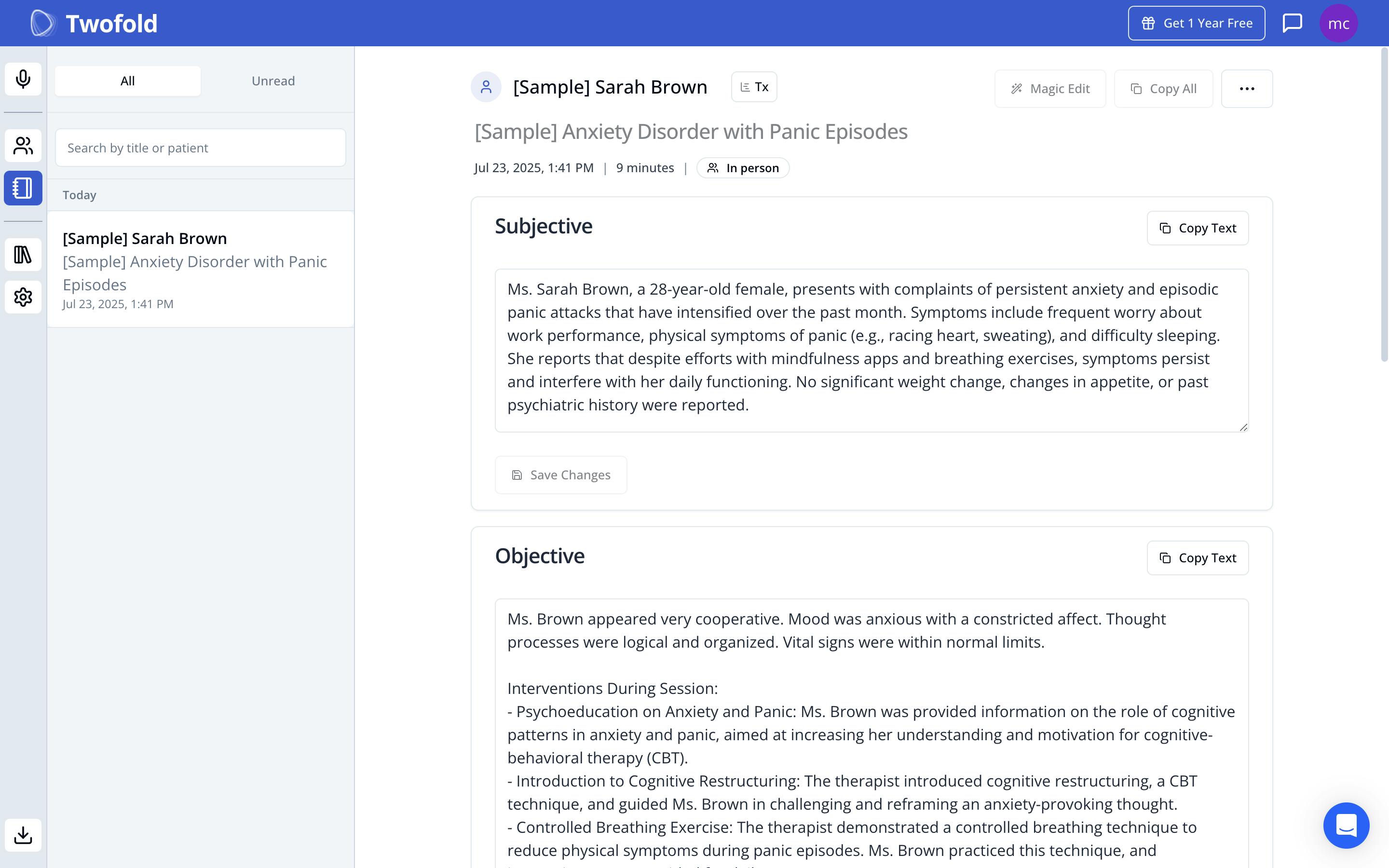
Twofold Health is a flexible AI therapy notes generator that supports DAP notes, SOAP notes, BIRP notes, intake forms, and full treatment plans.
What sets Twofold apart is its strong focus on privacy. For group practices, it also offers template customization and team-friendly features that keep documentation consistent across providers.
Pros:
- Supports multiple note types including intakes and treatment plans.
- Accepts a wide range of inputs: audio, dictation, or text.
- Strong privacy posture, no permanent storage of recordings.
- HIPAA/HITECH-compliant with signed BAAs available.
Cons:
- More expensive than lighter tools for solo therapists.
- Group practice pricing requires custom quotes, which may be less transparent.
Pricing: Free plan available; Personal plan at $49/month (annual billing) for unlimited notes; custom pricing for group practices.
Best For: Therapists or group practices needing customizable templates, strict privacy, and flexible input options.
7. ScribeHealth
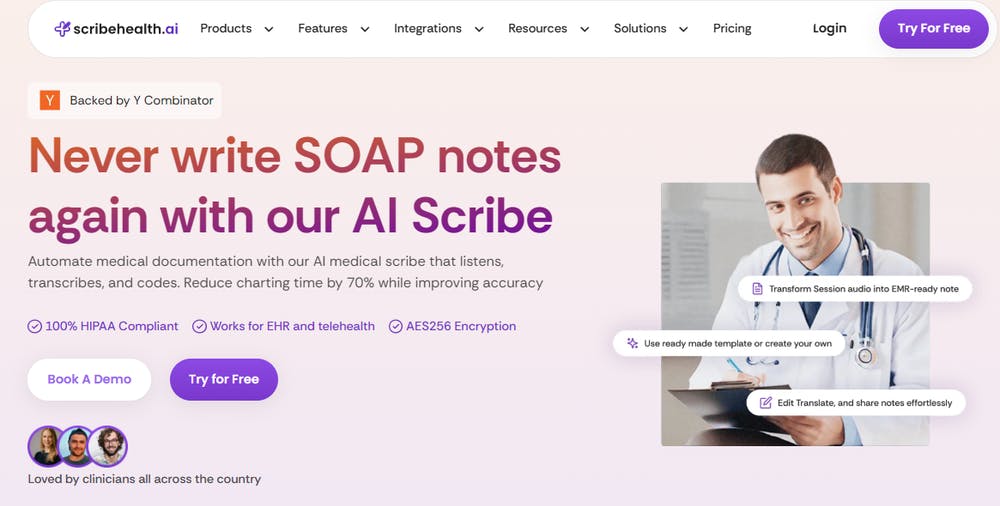
ScribeHealth is a straightforward AI DAP note generator built with therapists in mind. Its main strength is simplicity- using ready-to-go note templates that make it easy to produce structured DAP notes, SOAP notes, and treatment plans without a steep learning curve.
Therapists can work from bullet points, short summaries, or dictated notes, and the platform quickly expands them into professional drafts. For those new to AI documentation, its plug-and-play style makes onboarding smooth.
Pros:
- Easy to use, even for therapists with little tech experience.
- Provides multiple note templates that fit standard therapy documentation needs.
- HIPAA-compliant with safeguards for sensitive patient health information.
- Affordable entry with free and paid options.
Cons:
- Fewer customization features compared to more advanced platforms.
- May feel too basic for therapists needing advanced integrations or analytics.
Pricing: It offers a $49 per seat/month plan for unlimited sessions, with custom pricing for teams over 10 people.
Best For: Clinicians looking for a simple, template-driven note generator to speed up documentation without complexity.
8. Athelas Scribe
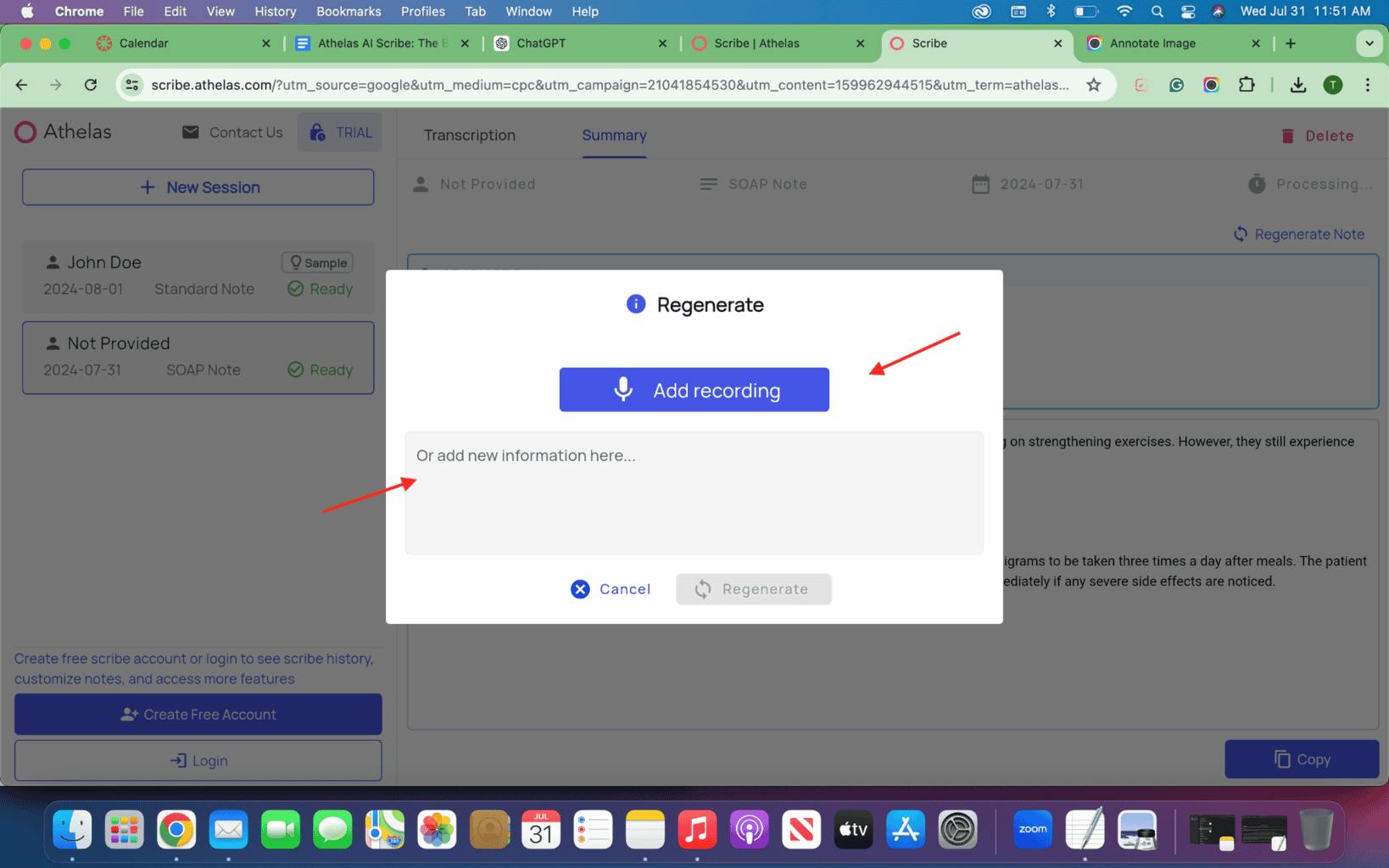
Athelas Scribe is an enterprise-level AI note generator designed for larger healthcare teams. It supports structured DAP notes, SOAP notes, and integrates tightly with EHRs, making it a strong fit for clinics that need reliable, large-scale clinical documentation.
The platform handles recording sessions and converts them into AI-generated notes, while also supporting ICD-10 coding for easier insurance billing.
Pros:
- Strong EHR integration and ICD-10 support for insurance billing.
- Handles session recordings with high accuracy, including multi-speaker recognition.
- Enterprise-grade compliance standards to safeguard sensitive patient health information.
- Scales easily for group practices and larger organizations.
Cons:
- Expensive compared to tools for solo therapists or small practices.
- More complex setup, requiring onboarding and IT support.
Pricing: Custom, enterprise-level pricing depending on team size and integrations.
Best For: Clinics and agencies that need enterprise-grade note generation with EHR integration and compliance for large teams.
Quick Comparison of the Best AI DAP Note Generators in 2026
Choosing the right platform depends on your caseload, workflow, and compliance needs. Here’s how the top 8 AI tools stack up side by side:
Tool | Best For | Note Types Supported | Pricing Snapshot |
|---|---|---|---|
Supanote | Solo & group practices wanting therapy-specific notes + EHR autofill | DAP, SOAP, BIRP, EMDR, group therapy | From $19.99/mo (40 notes) |
Upheal | Telehealth therapists wanting analytics + notes | DAP, SOAP | Free plan; Paid from £19/mo |
Mentalyc | Multi-modality therapy docs + progress tracking | DAP, SOAP, BIRP, EMDR | $19.99–$69.99/mo |
AutoNotes | Multi-disciplinary practices across healthcare | DAP, SOAP, BIRP | $250/yr (~$20.83/mo) |
Freed | High caseload clinicians needing unlimited notes | DAP, SOAP | $90/mo (solo); team discounts |
Twofold | Therapists needing flexibility + privacy | DAP, SOAP, BIRP, intake | Free plan; $49/mo individual |
ScribeHealth | Beginners wanting simple, template-driven notes | DAP, SOAP | Free + paid tiers |
Athelas Scribe | Clinics & agencies needing enterprise-grade compliance | DAP, SOAP | Custom enterprise pricing |
Key Factors to Consider Before Choosing
When selecting the best AI DAP note generator for your practice, here are the main things to weigh:
- Note formats supported → Some tools (like Supanote, Mentalyc, Twofold) cover DAP, SOAP, BIRP, EMDR, and treatment plans, while others just focus just on core progress notes.
- Input method → Tools vary between session recordings (Freed, Upheal), dictation (Supanote, AutoNotes), and bullet points or summaries (ScribeHealth).
- Analytics & insights → If you want outcome tracking and supervision dashboards, Upheal stands out.
- Compliance & privacy → All leading platforms are HIPAA compliant, but privacy-conscious providers may prefer Supanote( temporarily recordings stored) or Twofold (strict audio deletion).
- EHR integration → If direct EHR sync matters, Supanote and Athelas Scribe are strongest.
- Caseload size → Freed suits heavy caseloads with unlimited plans, while ScribeHealth are cost-effective for lighter workloads.
- Budget → Prices range from ~$20/month (Supanote) to enterprise-only pricing for larger systems (Athelas).
Making Your Decision
The right tool depends on your workflow, caseload, and practice setting:
- Supanote → Best for therapy-specific notes with EHR autofill.
- Upheal → Ideal for telehealth therapists who want analytics + documentation.
- Mentalyc → Great for multi-modality therapy practices needing templates + progress tracking.
- AutoNotes → Useful for multi-disciplinary clinics (mental health + physical therapy).
- Freed → Perfect for clinicians with large caseloads who prefer recording-based notes.
- Twofold → Strong option for therapists who want privacy-first workflows and customizable templates.
- ScribeHealth → Best for beginners who want a simple, template-driven system.
- Athelas Scribe → Built for enterprise-level compliance and large group practices.
FAQs
Q1. What is the best AI for therapy notes?
A. The best option depends on your needs. Supanote is ideal for therapy-specific documentation with EHR integration, Freed is great for unlimited recording-based notes, and Mentalyc offers multiple templates with progress tracking.
Q2. Which AI is best for creating notes?
A. For structured clinical notes like DAP notes or SOAP notes, Supanote and Mentalyc stand out for therapy, while Twofold is strong for privacy-focused documentation.
Q3. What is the best AI text-to-audio generator?
A. Most note tools focus on converting audio-to-text, not the other way around. For text-to-audio (converting written notes into spoken audio), you’ll need a separate tool—these platforms specialize in AI-generated clinical documentation, not playback.
Q4. Are AI Notes HIPAA-compliant?
A. Yes, leading tools like Supanote, Freed, Twofold, and Mentalyc are fully HIPAA-compliant and provide a signed BAA to protect sensitive patient health information. Always confirm compliance before entering client data.
Q5. Do I need to record sessions to use AI note generators?
A. No. Tools like Freed and Upheal work best with session recordings, but others like Supanote and ScribeHealth can generate notes from bullet points or dictated notes.
Q6. Will insurance accept AI-generated notes?
A. Yes, as long as they’re structured into compliant formats like DAP notes or SOAP notes. Many platforms are designed to create audit-ready, insurance-friendly notes.
Q7. How much time can AI note generators save?
A. On average, therapists report saving 50–80% of documentation time. What used to take 15–20 minutes per note can now be done in 2–5 minutes.
Q8. Which tools are best for group practices?
A. Supanote, Twofold, and Athelas Scribe are strong choices, because of their team features, compliance safeguards, and consistent formatting across multiple providers.


